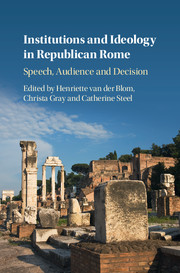Book contents
- Institutions and Ideology in Republican Rome
- Institutions and Ideology in Republican Rome
- Copyright page
- Dedication
- Contents
- Contributors
- Acknowledgements
- Abbreviations
- Introduction
- Part I Modes of Political Communication
- Part II Political Alliances
- Part III Institutions in Theory and Practice
- Chapter 9 Falsifying the Auspices in Republican Politics
- Chapter 10 When the Senators Became ‘The Best’
- Chapter 11 Private Knowledge and Public Image in Roman Elections
- Chapter 12 The ‘Wrong’ Meetings?
- Chapter 13 Servilia’s Consilium
- Part IV Memory and Reputation
- Bibliography
- Index
Chapter 11 - Private Knowledge and Public Image in Roman Elections
The Case of the Pro Murena
from Part III - Institutions in Theory and Practice
Published online by Cambridge University Press: 08 May 2018
- Institutions and Ideology in Republican Rome
- Institutions and Ideology in Republican Rome
- Copyright page
- Dedication
- Contents
- Contributors
- Acknowledgements
- Abbreviations
- Introduction
- Part I Modes of Political Communication
- Part II Political Alliances
- Part III Institutions in Theory and Practice
- Chapter 9 Falsifying the Auspices in Republican Politics
- Chapter 10 When the Senators Became ‘The Best’
- Chapter 11 Private Knowledge and Public Image in Roman Elections
- Chapter 12 The ‘Wrong’ Meetings?
- Chapter 13 Servilia’s Consilium
- Part IV Memory and Reputation
- Bibliography
- Index
Summary
- Type
- Chapter
- Information
- Institutions and Ideology in Republican RomeSpeech, Audience and Decision, pp. 222 - 235Publisher: Cambridge University PressPrint publication year: 2018



